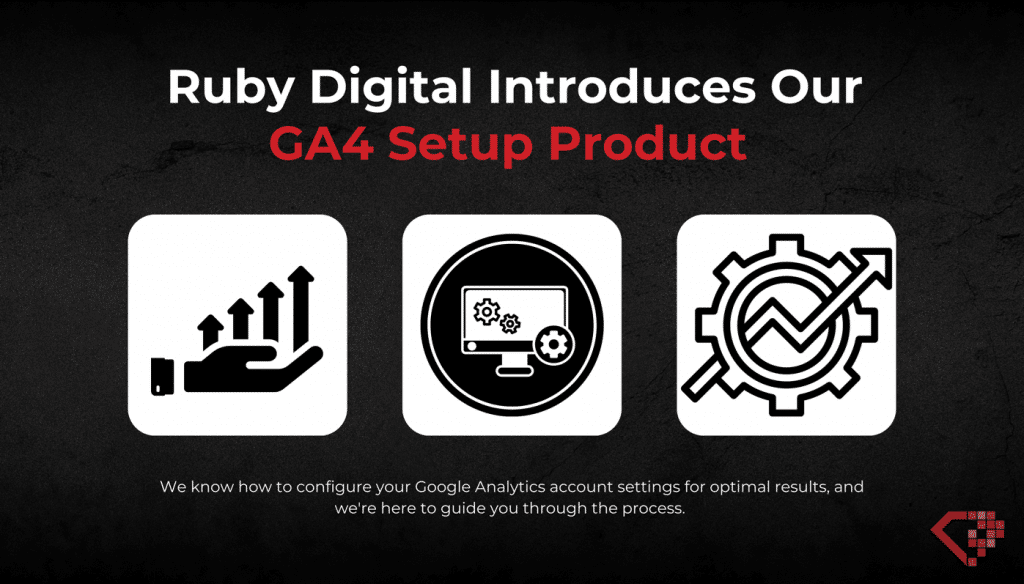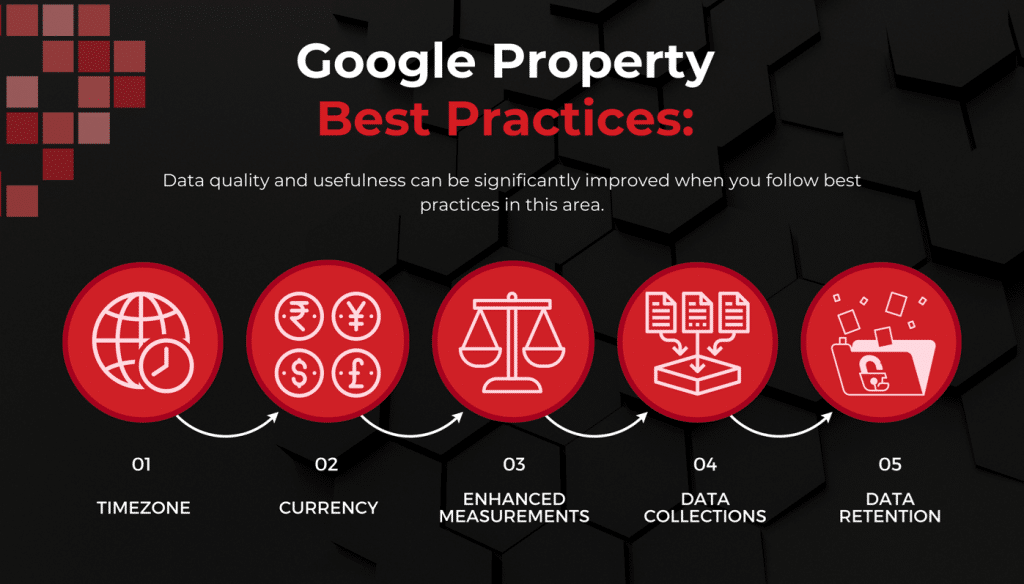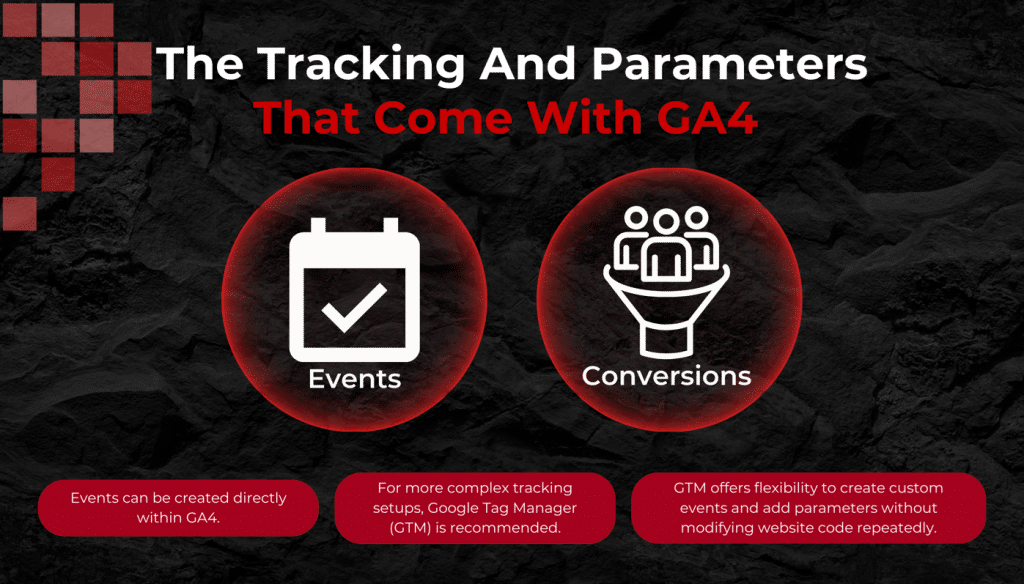Google Analytics 4 (GA4) represents a major shift in the way we approach digital analytics, moving from Google Analytics Universal (GA3) to a more comprehensive and future-focused platform. This transition is vital for businesses wanting to stay ahead in an increasingly digital world. However, many companies find themselves unprepared for this switch, potentially impacting their valuable data and insights.
At Ruby Digital, we anticipated this change and have been gearing up for it. In response, we’ve designed a product specifically tailored for setting up Google Analytics 4 accounts efficiently and correctly. Our goal is to get your data rolling again and even enhance your data-driven decision making.
Ruby Digital Introduces Our GA4 Setup Product
As thought leaders on the GA4 subject, we ensure that our expertise is reflected in our new product. We know how to configure your Google Analytics account settings for optimal results, and we’re here to guide you through the process.
This is not just about setting up Google Analytics. It’s about helping you understand your audience better, improving your marketing strategies, and making your online presence more effective.
By leveraging our GA4 setup product, we can provide detailed and accurate reporting on user engagement on your website, ensuring that tracking is accurate and insightful.

GA4 Setup and Best Practices
Setting Up a GA4 Account:
If you’ve been using GA3 and want to upgrade to GA4, here are the steps you should follow to set up your new account while preserving your historical data.
- Create a Google Analytics 4 account. This is a simple process that involves inputting your business information, such as your company name and website URL.
- Second, you’ll be required to add a new property. This is essentially the website or app that you want to track.
- Third, set up your data streams. These can be for the web, iOS, or Android apps, depending on where you want to collect data from.
- Then you’ll need to customise your data-sharing settings, select your reporting time zones and currency, and specify your industry category and business size.
Important to note: Setting up GA4 can sometimes get complex, and even a small mistake can impact your data’s accuracy. If you want to ensure everything is done correctly from the start, Ruby Digital’s GA4 product is your safest bet.
Google Property Best Practices:
While setting up a GA4 account is relatively straightforward, the real key to unlocking its full potential lies in the Google Analytics property settings. Following best practices in this area can significantly enhance the quality and usefulness of your data.
Here’s what we recommend:
- Ensure the correct timezone is used: This is essential for accurate data reporting. Make sure the timezone matches your business operations.
- Ensure the correct currency is used: GA4 allows you to track financial data, so it’s important to have the correct currency.
- Ensure enhanced measurements are added and activated: Enhanced measurements provide a deeper understanding of user interactions on your website or app. They should all be activated for a comprehensive view.
- At data settings, ensure data collections are activated and data retention is increased to 14 months: Activating data collections allows GA4 to gather a wide variety of data from your website or app. Increasing data retention to 14 months means you’ll have access to over a year’s worth of data for trend analysis.
At Ruby Digital, we can manage the whole setup process for you. Whether you’re starting from scratch or transitioning from GA3, our team ensures your GA4 account is set up accurately and effectively, ready to provide you with insightful data to inform your digital strategies.

The Tracking and Parameters That Come with GA4
Google Analytics 4 introduces advanced tracking capabilities that provide a more granular look at how users interact with your website or app. At Ruby Digital, we make sure these features are utilised to their fullest potential to give you the most accurate tracking of your conversions.
The Events and Conversions of GA4
In GA4, events and conversions provide key insights into user behaviour on your site.
Events are user interactions with a website or app that can be tracked independently from a webpage or a screen load. This could be anything from button clicks, form submissions, to video plays.
On the other hand, conversions are the most important subset of events. These are the actions you want users to take on your website or app – for example, making a purchase, filling out a form, or downloading a resource.
How to set up events in Google Analytics
Events can be created directly within GA4, but we recommend using Google Tag Manager for more complex tracking setups. The advantage here is the flexibility it offers, allowing you to create custom events and add parameters without needing to modify the code on your website each time.
Events are integral to understanding your website traffic and how users engage with your site. They can help you identify what works, what doesn’t, and where you can make improvements to drive better results.
Using Ruby Digital’s new GA4 setup product will ensure your conversions are not only set up correctly but also tracked accurately. This allows for reliable reporting and data-driven decision making.

Understanding the Specific Parameters and Values of GA4
With GA4, you can add specific Google Analytics parameters to your events, enriching the data collected and giving you a deeper understanding of your conversions.
Custom events allow you to specify event parameters that are not automatically tracked by GA4. For example, you could track the specific products viewed by users, the categories they browsed, or the amount of time they spent viewing certain pages.
These values are added to events within Google Tag Manager, allowing for more precise tracking and granular data.
GA4 has also introduced a new parameter, the “scroll depth“. This allows you to track how far down a page a user scrolls, giving you an idea of how engaged users are with your content.
Overall, GA4’s advanced tracking capabilities can provide valuable insights into how users interact with your site. At Ruby Digital, we ensure these features are set up and used effectively to provide you with the most reliable data, empowering you to make informed decisions to improve your site’s performance.
In Conclusion
As the shift from GA3 to GA4 became inevitable, Ruby Digital has prepared for this transition and is ready to guide our clients through it. While this guide provides a good starting point, the specifics of setting up and optimising Google Analytics can vary greatly from business to business. Ruby Digital can provide tailored support and professional setup to ensure your data collection is as precise and insightful as possible.
We have developed this product specifically to assist you in setting up and configuring your GA4 accounts, preparing you for future reports and strategies. Remember, setting up Google Analytics correctly is vital for data accuracy and insightful reporting. Our dedicated team at Ruby Digital is here to ensure you get the most out of GA4.
Learn more about our SEO services or Google Analytics Consulting.
Let Ruby Digital guide you through the GA4 journey. We’re here to make the transition smooth, accurate, and insightful. We look forward to assisting you in navigating the digital analytics landscape effectively!



